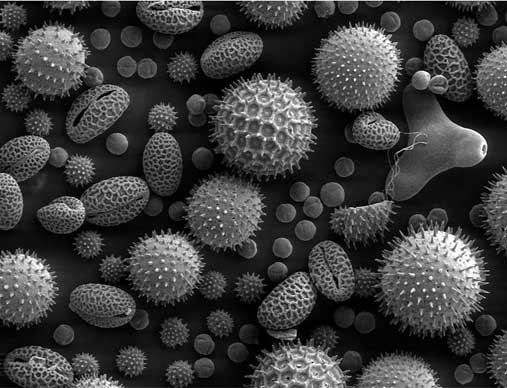
It’s usually hard to get DNA evidence from a spent bullet casing, but what if the surface could be enhanced to capture skin cells? Then, the board of police commissioners heard yesterday, grains of pollen like these might provide evidence matching pollen on a person’s hands to that found at a crime scene. Photo credit: Wikipedia.
While politicians here debate new gun laws, scientists in the United Kingdom have made an important but obscure breakthrough.
They found a way to trace spent brass shell casings back to the person who loaded them, Kansas City Police Lab Director Linda Netzel said.
On Tuesday, she reported that development and others to the Kansas City Board of Police Commissioners.
It is common to have 50 or more shell casings found after a gunfight and generally they are not tested for DNA, she said. One reason is there is little chance DNA will remain after the burst of heat from the fired bullet.
But United Kingdom scientists reported last year that they created ammunition that is far more likely to preserve DNA.
A July article in News World Wide quotes Paul Sermon, an engineer at Brunel University in London, telling how they found a way to “stash away skin cells.”
The leader of a government-funded team said, “It’s as simple as dunking a biscuit in a cup of tea.”
They dip the cartridge into a solution of aluminum oxide and urea to roughen it. That dries to an abrasive and ridged surface that is far more likely to retain DNA.
Tests found that 53 percent more viable DNA came from casings on those bullets than from normal ones.
They also were able to label the hands of anyone who touches the bullets. For that, they coated the bottom of the casings with pollen grains from an Easter lily and with titanium dioxide.
Netzel said it us unclear how much the new techniques would add to the cost of ammunition.
She also said that scientists there have created a “slasher hoodie,” which protects against knife attacks. The vests used by police in the United States stop bullets but not knife blades.
Handguns are illegal in the United Kingdom, which has many knife assaults and murders.
Mayor Sly James, recently back from a national gun summit, said killers here are more prolific and efficient since they mostly use guns.
“I’ve not heard of any drive-by knifings” or of knives going through walls and killing children, he said.



Who’s talking